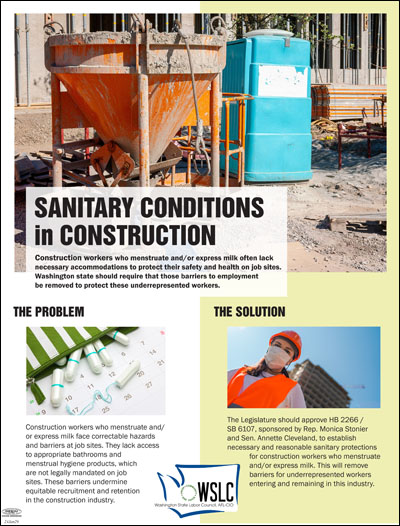STATE GOVERNMENT
Bill to guarantee sanitary jobsite conditions passes House
OLYMPIA (Feb. 13, 2024) — Construction workers who menstruate and/or express milk often lack necessary accommodations to protect their safety and health on job sites. They can lack access to appropriate bathrooms and menstrual hygiene products. These barriers undermine equitable recruitment and retention in the construction industry.
Washington’s Legislature took a step toward removing these barriers to well-paying jobs Friday with the House’s passage of HB 2266, sponsored by Rep. Monica Stonier (D-Vancouver). This bill will ensure that all employers in the state provide reasonable, sanitary accommodations for workers who menstruate, lactate, or express milk. Current law allows for exemptions for employers with mobile crews or those employing less than 15 workers.
 “You hear a lot of talk about getting people the training they need to move on to a family sustaining career,” said Stonier. “But that’s only half the equation. All the education and credentials in the world don’t mean anything if worksites can’t accommodate for those who have to deal with these natural occurrences.”
“You hear a lot of talk about getting people the training they need to move on to a family sustaining career,” said Stonier. “But that’s only half the equation. All the education and credentials in the world don’t mean anything if worksites can’t accommodate for those who have to deal with these natural occurrences.”
Some of the reasonable accommodations defined in the bill are more frequent and longer bathroom breaks, modified work schedules, and providing seating when it is not usually available. The bill aims to protect the health of workers while also providing additional privacy on jobsites.
“I am a working mother, so I know how difficult things can be in this regard,” said Stonier. “I’m an educator and I still faced many challenges in a school building. Guaranteeing that every worker has their basic needs met means more people can join the workforce and provide for their families.”
HB 2266 passed the House with a vote of 84-13. It now advances to the Senate for consideration.
 HB 2266 is among the priority legislation in the Washington State Labor Council’s 2024 Legislative Agenda. Here are some excerpts from the WSLC’s fact-sheet about why we need to improve sanitary conditions on construction job sites:
HB 2266 is among the priority legislation in the Washington State Labor Council’s 2024 Legislative Agenda. Here are some excerpts from the WSLC’s fact-sheet about why we need to improve sanitary conditions on construction job sites:
● Construction is a male-dominated industry so companies often fail to provide equitable sanitary facilities. This inequity creates a circular effect, preventing workers who menstruate and/or express milk from considering construction as a career, limiting the industry’s growth at a time of high demand.
● Workers who menstruate are in need of externally and internally locking bathrooms specifically designated for them. They need additional space and time to take off multiple layers to use the restroom, which may lead to additional time needed to dedicate to using the restroom. They also need access to menstrual products without having to leave the job site.
● Post-partum workers need reasonable accommodation regarding the expression of milk. That includes flexible work and break scheduling; a convenient, sanitary, safe, locking and private location that is not a restroom; a clean and safe water source for hand washing and sanitation of expression equipment; and hygienic refrigerator for safe storage.
● In California, the Legislature recently recognized the barriers women and nonbinary individuals face on jobsites, including access to clean and secure restrooms. Assembly Bill 521 passed in 2023 to require construction jobsites to have at least one separate toilet facility for employees who for employees who self-identify as female or nonbinary.
● Ontario recently mandated new rules for construction sites that require at least one dedicated bathroom for workers who menstruate and/or express milk, increases the number of toilets on most job sites, and requires washrooms to be private, enclosed, and have adequate lighting.





